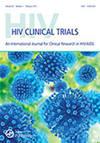SPIRIT研究中HIV-1耐药突变病毒抑制患者改用利匹韦林/恩曲他滨/富马酸替诺福韦二氧吡酯的临床结果*
Q2 Medicine
引用次数: 23
摘要
目的:对于hiv -1感染、病毒学抑制的患者,可以考虑转换抗逆转录病毒治疗方案,以简化治疗或提高耐受性,但应以预先存在的耐药性知识为指导。目前的研究检查了在病毒学抑制的患者改用利匹韦林(RPV)/恩曲他滨(FTC)/富马酸替诺福韦二氧吡酯(TDF)时,预先存在的耐药突变对病毒学结果的影响。方法:SPIRIT是一项3b期研究,评估在病毒学抑制的hiv -1感染患者中切换到RPV/FTC/TDF的安全性和有效性。对51例RPV/FTC/ tdf治疗的已知历史RNA基因型突变患者和匹配对照组,通过前病毒DNA基因分型确定基线时已有的耐药情况,并与第48周的临床结果进行比较。结果:62.7%的患者通过历史RNA基因型检测到蛋白酶或逆转录酶耐药突变,68.6%的患者通过基线前病毒DNA基因型检测到耐药突变。根据历史基因型,前病毒DNA测序检测到89%的NRTI和NNRTI耐药性相关突变。通过一种或两种检测方法在11例患者的分离株中检测到可能影响RPV活性的突变,包括E138A/G/K/Q、Y181C和H221Y。在48周内,没有单个突变体的患者出现病毒学失败。1例原病毒DNA基因分型存在Y181Y/C和M184I的患者出现病毒学失败。19例历史基因型存在的K103N患者通过前病毒DNA测序证实,18/19保持病毒学抑制。讨论:在SPIRIT研究中,已有NRTI和NNRTI耐药相关突变的病毒学抑制患者转换为RPV/FTC/TDF的病毒学成功率很高。虽然血浆RNA基因分型仍然是首选,但前病毒DNA基因分型可能为无法获得历史耐药数据的病毒学抑制患者提供额外的价值。本文章由计算机程序翻译,如有差异,请以英文原文为准。
Clinical Outcomes of Virologically-Suppressed Patients with Pre-existing HIV-1 Drug Resistance Mutations Switching to Rilpivirine/Emtricitabine/Tenofovir Disoproxil Fumarate in the SPIRIT Study*
Objectives: Antiretroviral regimen switching may be considered for HIV-1-infected, virologically-suppressed patients to enable treatment simplification or improve tolerability, but should be guided by knowledge of pre-existing drug resistance. The current study examined the impact of pre-existing drug resistance mutations on virologic outcomes among virologically-suppressed patients switching to Rilpivirine (RPV)/emtricitabine (FTC)/tenofovir disoproxil fumarate (TDF). Methods: SPIRIT was a phase 3b study evaluating the safety and efficacy of switching to RPV/FTC/TDF in virologically-suppressed HIV-1-infected patients. Pre-existing drug resistance at baseline was determined by proviral DNA genotyping for 51 RPV/FTC/TDF-treated patients with known mutations by historical RNA genotype and matched controls and compared with clinical outcome at Week 48. Results: Drug resistance mutations in protease or reverse transcriptase were detected in 62.7% of patients by historical RNA genotype and in 68.6% by proviral DNA genotyping at baseline. Proviral DNA sequencing detected 89% of occurrences of NRTI and NNRTI resistance-associated mutations reported by historical genotype. Mutations potentially affecting RPV activity, including E138A/G/K/Q, Y181C, and H221Y, were detected in isolates from 11 patients by one or both assays. None of the patients with single mutants had virologic failure through Week 48. One patient with pre-existing Y181Y/C and M184I by proviral DNA genotyping experienced virologic failure. Nineteen patients with K103N present by historical genotype were confirmed by proviral DNA sequencing and 18/19 remained virologically-suppressed. Discussion: Virologic success rates were high among virologically-suppressed patients with pre-existing NRTI and NNRTI resistance-associated mutations who switched to RPV/FTC/TDF in the SPIRIT study. While plasma RNA genotyping remains preferred, proviral DNA genotyping may provide additional value in virologically-suppressed patients for whom historical resistance data are unavailable.
求助全文
通过发布文献求助,成功后即可免费获取论文全文。
去求助
来源期刊

HIV Clinical Trials
医学-传染病学
CiteScore
1.76
自引率
0.00%
发文量
0
审稿时长
>12 weeks
期刊介绍:
HIV Clinical Trials is devoted exclusively to presenting information on the latest developments in HIV/AIDS clinical research. This journal enables readers to obtain the most up-to-date, innovative research from around the world.
 求助内容:
求助内容: 应助结果提醒方式:
应助结果提醒方式:


